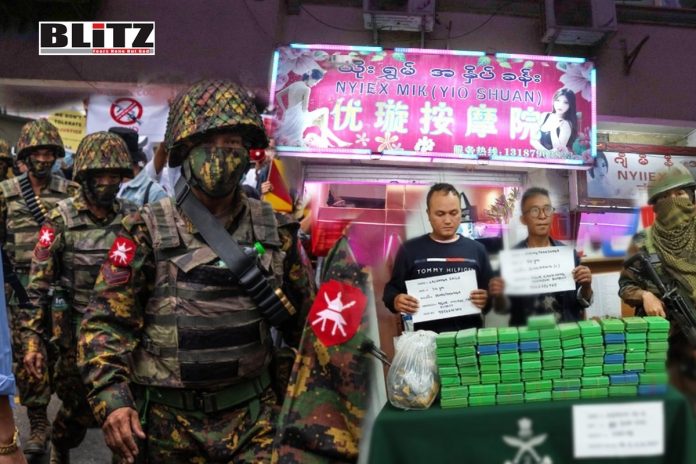Myanmar junta, by establishing connections with numerous local militia groups, is orchestrating transnational drug, cyber-scam, and prostitution rings. These illicit activities are centralized in the ‘Shwe Kokko’ towers, located in Karen State’s Myawaddy township, which is nearly a stone’s throw away from Thailand. Media reports reveal that the Myanmar junta recruits sex workers from a wide array of countries including Vietnam, Cambodia, Thailand, Taiwan, Indonesia, the Philippines, India, Colombia, Brazil, Kenya, Bangladesh, and Pakistan. These sex workers are employed at ‘Shwe Kokko’ towers with the notorious aim of luring American and European tourists to sell Myanmar-made Yaba pills and other drugs. They are also encouraged to participate in online gambling, with the ultimate goal of stealing their banking details and cheating them out of large amounts of money. In recent years, sex workers from Ukraine, Uzbekistan, Iran, Lebanon, and Egypt visiting Thailand have also been recruited for such purposes, targeting wealthy Arab and Asian tourists. Additionally, a significant number of Hindu Rohingya females are forcibly drawn into prostitution within these establishments.
According to The Irrawaddy, the ‘Shwe Kokko’ operations are overseen by Colonel Saw Chit Thu, leader of the Karen State Border Guard Force (KSBGF) or BGF. In recent weeks, as confrontations between Myanmar junta troops and ethnic Karen fighters escalated in Myawaddy, Colonel Thu played both sides to protect his booming criminal enterprises, which generate millions of dollars monthly. Several years ago, Colonel Saw Chit Thu signed a ceasefire with Myanmar’s army, rebranding his breakaway Democratic Karen Buddhist Army as the Karen BGF under partial military command.
In 2017, Saw Chit Thu formed a joint venture with Yatai International, owned by She Zhijiang, a Chinese national holding Cambodian citizenship. This led to the creation of Karen BGF’s Chit Linn Myaing Co Ltd, a front for Chinese investment to develop a $15-billion special economic zone (SEZ) in Shwe Kokko. The project was marketed as a high-tech hub featuring an airport, industrial zone, villas, amusement park, hotels, and other facilities.
Further reports from The Irrawaddy indicate that Chinese triad gangs and organized crime syndicates are connected to ‘Shwe Kokko,’ located on the northern side of Thailand’s Mae Sot. Although Myawaddy township is often referred to as Myanmar’s Silicon Valley, the military junta has repurposed the high-tech expertise and infrastructure for transnational criminal activities. KK Park, also known as KK Garden, has become a trafficking hub for victims from Malaysia and India. Both male and female victims in Shwe Kokko and KK Park are imprisoned and forced to work for crime syndicates as online scammers and sex workers. Their families are often coerced into paying ransoms for their release.
The Irrawaddy’s reports reveal that once a humble village of cattle smugglers and Karen BGF, Shwe Kokko has been transformed into the Chinatown of Karen State. Chinese investors, workers, and gamblers now flock to the area, turning it into a hub for online gambling and scams under the leadership of She Zhijiang.
In 2018, the Myanmar Investment Commission approved the first phase of the Shwe Kokko New City project: a US$22.5-million construction of 59 luxury villas on 10.3 hectares. However, construction activities expanded far beyond these initial limits. The once sleepy town of Mae Sot in the 2000s has evolved into a bustling city with luxury vehicles, upscale restaurants, and hotels, with flights from Bangkok mostly fully booked.
The developers initially claimed that Shwe Kokko New City was part of China’s Belt and Road Initiative (BRI), but Beijing disavowed the project after it came under scrutiny by Daw Aung San Suu Kyi’s government. In 2020, the Chinese embassy in Naypyidaw supported the Myanmar government’s move to investigate irregularities surrounding the controversial city development project in Karen State. Consequently, Thailand cut off power and telecom services to Shwe Kokko. However, these services were restored within weeks following the 2021 coup.
Despite these setbacks, Chinese nationals continued to migrate to Mae Sot. Among them was She Zhijiang, who, although a fugitive in China, holds a Cambodian passport after investing in casinos there. Also known as Dylan She, he is the chairman of Yatai International Holding Group. In August 2022, Thai authorities arrested She Zhijiang on charges of running illegal online gambling platforms.
The United States Institute of Peace (USIP) reports that several transnational Chinese criminal gangs operate hotels and casinos in the northern Shan State borderlands, also known as the Golden Triangle. Their local partners include border guard forces and various militia and insurgent groups. These criminal entities have only grown stronger and found new opportunities to generate illicit income following the coup.
The Myanmar military issues licenses to its allies and cronies to run hotels, clubs, and casinos in towns along the border with Thailand and China. These operators pay annual fees to the military. Notably, Myanmar businessman Tun Min Latt, an arms broker and drug trafficker, maintains direct connections with top generals, including Min Aung Hlaing and his family. Tun Min Latt runs the Star Sapphire Group and operates several hotels and casinos in the border town of Tachilek in northern Shan State. His Allure Resort offers a casino, shopping, and other entertainment options for Thai and Chinese gamblers.
Tun Min Latt’s deep connections with high-ranking generals, including Min Aung Hlaing, grant him the freedom to run lucrative and illicit businesses along the border. His company pays annual fees to the military, and he has also provided considerable sums of money to the regime leader and his family. This entrenched network of corruption and criminal enterprise underscores the Myanmar junta’s exploitation of local and transnational resources for personal gain, perpetuating a cycle of crime and impunity that affects numerous countries and countless lives.




